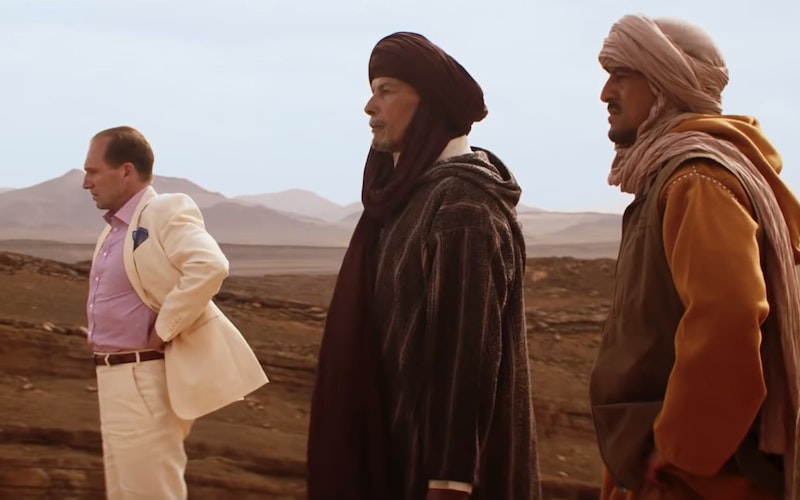
Movies
Ralph Fiennes’ Refusal to Be Forgiven
If a tree falls in a forest and no one is around to hear it, does it make a sound? The Forgiven, a new film from writer-director John Michael McDonagh, darkly twists that premise. If, while on a holiday in Morocco, a wealthy Western couple (Ralph Fiennes and Jessica Chastain) run over a local village boy (Omar Ghazaoui) in the middle of an empty road and no one is around to see the murder, did it really happen?
From there, The Forgiven spirals into even murkier moral territory. Knowing that they are culpable because Fiennes’ David was driving drunk, the couple takes the boy’s corpse to the villa of a friend (Matt Smith). When the police come, David blames Driss, the boy, for being careless. Eventually Driss’ father Abdellah (Ismael Kanater) comes to collect his son’s body. He asks David to help bury Driss, to which David reluctantly agrees. As David and Abdellah journey back to the latter’s village, Abdellah tries to determine the truth of what happened and, in turn, give David a chance to confess.
Those familiar with McDonagh’s 2014 film, Calvary, should not be surprised that the ideas of repentance and confession are central here. Yet McDonagh grounds these themes against the backdrop of socioeconomic conflict. When the powerful abuse the legal system for their own means, what does justice look like for victims? Is reconciliation possible when the oppressors don’t believe they have done anything wrong?
David and Jo exploit the justice system for their own means, even if it comes at the cost of truth. It’s revealed that after running over Driss, David hid the boy’s ID to further cement that Driss was a “nobody.” Additionally, McDonagh visually explores the blindness of privilege in clever ways. As he and Jo drive across the desert, David comments, “The roads are empty.” In the next shot, however, viewers see Driss and other Moroccan villagers collecting fossils to make ends meet. These roads are teeming with communities that David and Jo choose not to see, a foreshadowing of the disregard they’ll later show for Driss’ life.
Is reconciliation possible when the oppressors don’t believe they have done anything wrong?
Because David believes that the Moroccan people are beneath him, he finds it difficult to humble himself and apologize, making reconciliation impossible. Author Cole Arthur Riley, in her book This Here Flesh, suggests that when there is an imbalance of power between the offended and the offender, in order for healing to begin, these words are essential: “Will you forgive me?” Riley writes, “To ask forgiveness is to shift the balance of power in favor of the wounded. It requires you to become vulnerable to their denial. For a moment or perhaps many moments, the weight of your soul depends on the humanity of the one you sought to demean.”
David never utters these words to Abdellah. He is unwilling to place the “weight of his soul” in this father’s hands. Even when face to face with Abdellah’s anguish as the two sit alone, David remains coolly committed to his lie. He expresses remorse and sadness, even, but these are poor substitutes. He never admits that Driss’ death was his fault. This failure to confess buries the possibility for reconciliation.
The Forgiven does not end with David and Jo driving off consequence-free. (Spoilers ahead.) Abdellah, who earlier in the film scoffs that the Americans “think God is blind,” gets a form of revenge, even if he is denied justice. This, in part, is a reminder that God is not silent to the cries of the vulnerable and oppressed. Those who are marginalized can take comfort that vengeance is the Lord’s and that the kingdoms of abusive power will not have the final say.
At the same time, we are more often like David than we care to admit. Covering up sin often seems far more tempting than doing the painful work of confession. Another David comes to mind here: that of King David, who, after committing sexual sin, had his soldier Uriah killed in order to hide it.
This is what makes Christ’s sacrifice on our behalf so miraculous: He willingly paid the price for sin he did not commit and therefore did not need to admit. He, being the one with all the power, humbled himself to die a death he didn’t deserve, that we might be reconciled with him. Keeping this in mind, may we live as those who have been forgiven. May we humbly dare to look into the eyes of those we’ve wronged and confess, in order that restoration may begin.
Topics: Movies